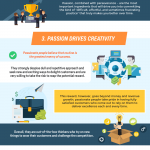Quiet Doesn’t Cut It: Why Your Brain Might Work Better In Silence
Shhh. Hear that?
No? That’s surprising. Odds are, you can hear something right now: A siren, the hum of a fan, the blur of background conversations, the ticking of a watch. It’s seldom that our worlds are fully silent–so seldom, that complete silence feels shocking.
We welcome sound into our lives unthinkingly, sometimes to our detriment. And according to the latest research, silence is perhaps one of our most underappreciated productivity tool.
The Problems With (Even A Little) Noise
But first let’s talk about noise.
It’s common knowledge that the jarring sound of a jackhammer—or the loud blasts of a rock concert—can damage our hearing, but that’s not the only type of harmful noise. There are actually two other kinds of everyday noise that can be bad for us. One is excessive noise, such as the prolonged loud noise of being near an airport. The other is simply the distraction of general noise around us, such as conversations or interruptions from colleagues in the workplace.
The former may seem worse, but both can be detrimental to our productivity. Those of us who don’t live or work near an airport or a highway may not necessarily have it easy. The daily noise of even a relatively “quiet” office still tends to involve a lot of auditory interruptions and distractions. Coworkers, meetings, phone calls, bustling cafés, street noise, and our phones’ notification sounds all vie for our attention as we try to work.
And these problems are often magnified if you work in an open-plan office. Ollie Campbell, CEO of Milanote and part of Navy Design‘s multidisciplinary team, says open-plan offices come with their own implicit values. They make team members feel that disruption is acceptable, collaboration is the key priority, and serendipity is worth the interruptions it requires. As Campbell points out on Medium, “In most workplaces, focused work is left to chance. If nobody’s called you for a meeting that day, you might get an afternoon to yourself.”
That’s if you’re lucky.
Distractions and interruptions are such a common part of our workdays, we don’t even think of them as excessive noise anymore. It’s often more obvious when we don’t hear the noise of distractions around us at work than when we do. A study at the University of California, Irvine, found that knowledge workers have focus periods of just 11 minutes on average in between interruptions. As Campbell said, “if you need to focus, ‘work’ is pretty much the worst place you could be.”
Collaboration is important, but so is focus—particularly for those of us who are creators. For knowledge workers, our work happens between us and the blank page. Disruptions and noise only interrupt that process.
Between interruptions, distractions, background noise, and general lack of calm and quiet, the noise of the office can be harmful. With a buzzing office around you, a bustling street out the window, and something distracting you every three minutes, it’s almost impossible to create anything of value.
Shutting both types of noise out–literal (and excessive) sound, and the more general commotion of the modern workplace—can improve our ability to focus and create our best work.
Here’s why you should replace noise with silence.

Silence Gives Your Brain A Break
For a long time, researchers used silence as a control in experiments testing the effects of sound or noise. After realizing silence was fascinating in itself, researchers started focusing more on the effects of silence than relegating it to control status.
In one experiment testing how the brain reacts to different types of music, silence was used as a control between the different music clips. But silence actually produced one of the most interesting effects. When compared with so-called “relaxing” music—or even long silence before the experiment began—short, two-minute silent pauses between the music actually proved more relaxing on the brain. It seems the effect of silence is heightened by contrasting it with noise.
Perhaps our strong reaction to silence’s relaxing effects is related to how our brains work when they’re not bombarded by the outside world. Research suggests our brains are never really quiet—instead, they’re always working, even when we’re not actively engaged in a conscious activity. In fact, science suggests when we do engage our brain in a conscious effort, it actually overrides the brain’s “default mode,” temporarily diverting resources to what we want to do.
Complete silence, then, allows the brain to return to its normal default state and continue its processing.
Our brain’s ongoing background processing seems to be responsible for the sounds our brain makes, too. For instance, when a song you know well is stopped in the middle of the chorus, your brain will often fill in the gap by creating the sound of the next line of the song. You’re not actually hearing anything, but rather creating that sound inside your mind, according to Robert Zatorre, an expert on the neurology of sound. “In the absence of sound, the brain often tends to produce internal representations of sound,” Zatorre told writer Daniel A. Gross in a 2014 Nautilus article.
Silence isn’t simply relaxing for the brain, either. One study of mice, which Gross cites in the same story, found that listening to silence for two hours every day prompted the subjects’ brains to grow new cells in the hippocampus, which is related to our brain’s memory abilities. While new cell growth doesn’t always provide health benefits, in this case those new cells did become new, functioning neurons within the mice brains. In other words, silence could make you a little smarter.

We Do Our Best Work In Silence
The ability to shut out the world around us can be beneficial, beyond the pure benefits of silence. Both thinking creatively and considering long-term decisions are skills that, according to psychologist Jonathan Smallwood, “allow us to generate novel solutions to problems,” and to stick to our plans long enough to reach our goals.
“It seems that the capacity to disengage from the outside world when the external environment is sufficiently benign reflects a skill set that is important to almost every human endeavor,” says Smallwood. Put simply, these skills help us achieve success.
Smallwood isn’t the only one who thinks getting away from the noise of the world is a useful habit to build. French mathematician and philosopher Blaise Pascal believed humans should learn to be quiet more often, remarking, “All the unhappiness of men arises from one simple fact: that they cannot sit quietly in their chamber.”
Derek Sivers, writer and founder of CDBaby, says spending time alone, away from the noise of the world, provides the best opportunity for creating new work: “It’s not that I hate people. The other best times in my life were with people. But it’s interesting how many highlights were just sitting in a room, in that wonderful creative flow. Free from the chatter of the world.”
For Sivers, spending time unplugged, disconnected, and in silence is where he feels most creative. “Silence is a great canvas for your thoughts,” says Sivers.
At design agency Navy, the struggle to get work done in the office was real. The constant distractions and regular noise was such an issue that employees were staying home when they really needed to focus. To fix this, the Navy team instituted daily “quiet time.”
Before lunch at Navy HQ, the team agrees to be completely silent. Not just in person, but online, too. No emails, no Slack, no tapping colleagues on the shoulder, and especially no meetings. They even put their phones away in drawers so they can really focus. As Campbell explains, “Quiet time is a contract: a few hours a week where we agree to work, even if we don’t feel like it.”
Though it took months to get used to regular quiet time, after doing it for four years, Campbell reckons that the team is now 23% more productive. They’re also less stressed overall and able to take Friday afternoons off because they get so much done during the week.
It worked. “Work has become the best place to get things done,” says Campbell.
You can’t always escape noise. Sirens will go by, you’ll get stuck at an airport for hours, and you can’t force your coworkers to be quiet. And sometimes, you’ll want to work from a noisy coffee shop or attend a concert.
But when you can, it’s worth choosing silence. Perhaps you can start by adding a period of strict quiet time in your workplace. Strive to find small pockets of silence for yourself during the day, and savor the silence. Or, if you can, perhaps it’s time to add extra insulation and block out the consistent noise from your home and office, something that might pay for itself in increased focus and direct health benefits.
Finding silence and a calm space for yourself won’t just improve your health—it’ll help you do the best work you can.
A version of this article originally appeared on Zapier. It is adapted and reprinted with permission.
Fast Company , Read Full Story
(49)














